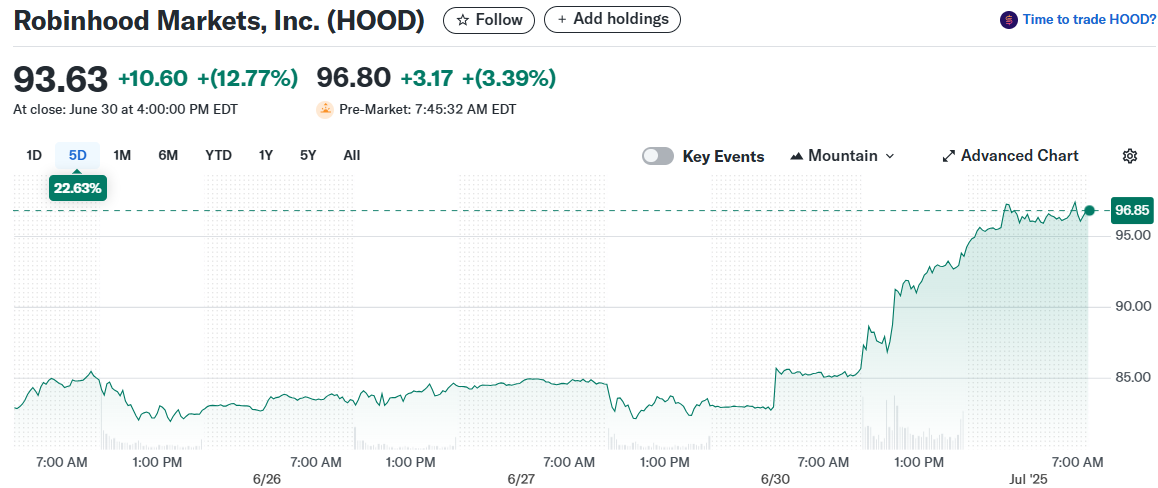TLDR
- Robinhood launched a layer-2 blockchain on Arbitrum offering 200+ tokenized US stocks and ETFs to European users with zero commissions and 24/7 trading
- Stock surged 12.8% on Monday following the announcement, reaching $93.66 per share
- Company introduced perpetual futures in the EU with up to 3x leverage, routed through recently acquired Bitstamp exchange
- Robinhood added crypto staking for US users and micro futures contracts for Bitcoin, XRP, and Solana
- The tokenized stock market represents less than $400 million of the $24 billion RWA market, leaving room for growth
Robinhood Markets stock rocketed higher on Monday as the company unveiled its ambitious move into tokenized trading for European customers. The stock closed at $93.66, up $10.63 or 12.8% for the day.

The trading platform announced the launch of commission-free tokenized US stocks and ETFs for European Union customers. The new service operates on a layer-2 blockchain built on Arbitrum.
European investors can now access over 200 US stocks and ETFs through Robinhood’s new platform. The tokens represent popular names like Nvidia and Apple, allowing trading outside traditional US market hours.
Let’s tokenize.
Starting today, European investors get exposure to U.S. stocks and ETFs, powered by our new blockchain-based tokenization technology.#RobinhoodPresents https://t.co/g2tVe86dUu pic.twitter.com/2KD1uVRoUz
— Robinhood (@RobinhoodApp) June 30, 2025
The tokenized assets offer 24/7 trading availability, five days a week. This marks a departure from standard stock market trading hours that limit investor access.
Robinhood’s tokens eliminate commission fees entirely for European customers. The company positions this as a competitive advantage over traditional brokerages.
The blockchain-based trading represents a fusion of cryptocurrency technology with traditional equity markets. Robinhood built the system to blur the lines between crypto and stock trading.
Expanding Crypto Offerings
The company didn’t stop at tokenized stocks for its European expansion. Robinhood also introduced perpetual futures trading in the EU with up to three times leverage.
These derivative trades route through Bitstamp, the crypto exchange Robinhood acquired for $200 million earlier this year. The acquisition now provides infrastructure for expanded European operations.
For US customers, Robinhood rolled out crypto staking services. The platform also launched micro futures contracts for Bitcoin, XRP, and Solana.
The micro futures require lower capital requirements than standard derivatives. This opens derivatives trading to smaller retail investors.
Robinhood faces competition from established crypto exchanges like Coinbase and Kraken. The company seeks to differentiate through its integrated approach combining traditional and crypto assets.
Market Context and Valuation
The Real World Asset market has grown to over $24 billion as of June 2024. However, tokenized stocks represent less than $400 million of this total market.
Private credit and US Treasury debt drive most RWA growth currently. This leaves substantial room for expansion in tokenized equity markets.
Robinhood isn’t alone in offering tokenized stocks to European investors. Gemini already provides tokenized MicroStrategy shares to give investors Bitcoin exposure.
The company submitted a proposal to the SEC for establishing a national RWA framework. This includes plans for a Real World Asset Exchange with offchain trading and onchain settlement.
Robinhood’s stock trades at nearly 50 times earnings, reflecting high growth expectations. The valuation appears steep but reasonable for a rapidly expanding tech company.
The company’s revenue and earnings have grown substantially in recent quarters. However, investors should consider the premium valuation when evaluating the stock.
Recent Developments
In May, Robinhood acquired Canadian crypto operator WonderFi for $179 million. This deal expanded the company’s crypto capabilities and geographic reach.
The company has been building its crypto infrastructure through strategic acquisitions. The Bitstamp purchase provides European regulatory compliance and trading infrastructure.
Robinhood’s push into tokenized assets represents a new revenue stream beyond traditional stock trading. The company seeks to capture market share in the growing RWA space.
The 24/7 trading capability could attract investors frustrated with traditional market hours. European customers can now trade US assets during local business hours.
Robinhood’s tokenized trading launch comes as the company reports strong user growth and engagement metrics across all platforms.






